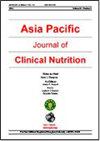母亲发酵食品摄入量与婴儿神经发育:日本环境与儿童研究
IF 1.3
4区 医学
Q4 NUTRITION & DIETETICS
Asia Pacific journal of clinical nutrition
Pub Date : 2024-03-01
DOI:10.6133/apjcn.202403_33(1).0008
引用次数: 0
摘要
背景和目的发酵食品在建立肠道细菌群方面发挥着重要作用,而肠道细菌群的组成可能与神经发育有关。这项研究调查了母亲在怀孕期间摄入发酵食品与后代早期神经发育之间的关系。方法和研究设计分析了参加日本环境与儿童研究的 73522 名孕妇的数据。使用半定量 FFQ 评估了她们在怀孕期间对四种常见发酵食品的摄入量。结果多变量逻辑回归分析表明,母亲摄入味噌汤和发酵大豆与婴儿交流能力延迟的风险显著降低有关。在第三和第四四分位数中,母亲摄入发酵大豆和奶酪分别与婴儿精细动作技能延迟风险的显著降低有关。在解决问题方面,在第二和第三四分位数中,观察到母亲摄入发酵大豆与预防性相关,在第三和第四四分位数中,观察到母亲摄入奶酪与预防性相关。在第三和第四四分位数中,母亲摄入酸奶与个人-社会技能延迟风险的显著降低有关,而在第三四分位数中,母亲摄入奶酪与风险的降低有关。结论我们的研究结果表明,孕期发酵食品的摄入量可能与儿童心理运动发育的多个方面存在有益的联系。本文章由计算机程序翻译,如有差异,请以英文原文为准。
Maternal fermented food intake and infant neurodevelopment: The Japan Environment and Children's Study.
BACKGROUND AND OBJECTIVES
Fermented foods play an important role in establishing intestinal bacterial flora, and the composition of the intestinal bacterial flora might be associated with neurodevelopment. This study investigated the association between maternal intake of fermented foods during pregnancy and early neuro-development in offspring.
METHODS AND STUDY DESIGN
Data were analyzed for 73,522 pregnant women participating in the Japan Environment and Children's Study. Their intake of four common fermented foods during pregnancy was assessed using a semi-quantitative FFQ. Neurodevelopment in their infants at 1 year of age was estimated using the Ages and Stages Questionnaires.
RESULTS
Multivariable logistic regression analysis showed that maternal intake of miso soup and fermented soybeans was each associated with a significantly reduced risk of delay in infant communication skills. Maternal intake of fermented soybeans and cheese was each associated with a significantly reduced risk of delay in fine motor skills in the third and fourth quartiles. For problem-solving, preventive associations were observed with maternal intake of fermented soybeans in the second and third quartiles and with maternal intake of cheese in the third and fourth quartiles. Maternal intake of yogurt was associated with a significantly reduced risk of delay in personal-social skills in the third and fourth quartiles, while that of cheese was associated with a reduced risk in the third quartile. No reductions in risk were observed for gross motor skills.
CONCLUSIONS
Our results suggest that fermented food intake during pregnancy may have beneficial associations with several areas of psychomotor development in children.
求助全文
通过发布文献求助,成功后即可免费获取论文全文。
去求助
来源期刊
CiteScore
2.50
自引率
7.70%
发文量
58
审稿时长
6-12 weeks
期刊介绍:
The aims of the Asia Pacific Journal of Clinical Nutrition
(APJCN) are to publish high quality clinical nutrition relevant research findings which can build the capacity of
clinical nutritionists in the region and enhance the practice of human nutrition and related disciplines for health
promotion and disease prevention. APJCN will publish
original research reports, reviews, short communications
and case reports. News, book reviews and other items will
also be included. The acceptance criteria for all papers are
the quality and originality of the research and its significance to our readership. Except where otherwise stated,
manuscripts are peer-reviewed by at least two anonymous
reviewers and the Editor. The Editorial Board reserves the
right to refuse any material for publication and advises
that authors should retain copies of submitted manuscripts
and correspondence as material cannot be returned. Final
acceptance or rejection rests with the Editorial Board

 求助内容:
求助内容: 应助结果提醒方式:
应助结果提醒方式:


